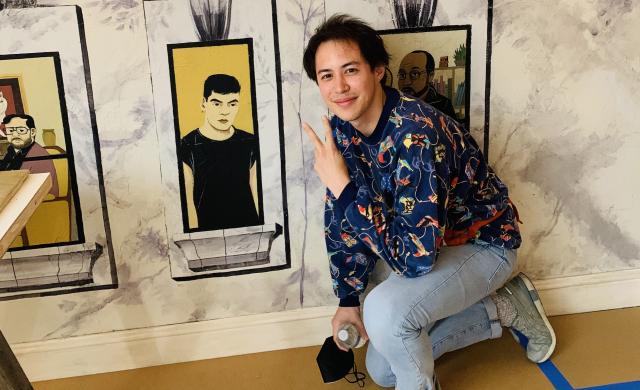In our alumni spotlight series, learn about Harvard graduates' most meaningful experiences from college, and how Harvard impacted their professional and personal paths after graduation.
Hometown & Current City: Lexington, MA; Los Angeles, CA
House Affiliation: Dunster House
Concentration: History and Science, Spanish Citation
What was your professional path after college?
Shortly after graduation, I moved out to Los Angeles to pursue a career in TV writing. That first year was comprised of assistant work, writing my own scripts, and spending time with lots of other aspiring writers from school. I got my first writing job in 2013, and since then have been working on a myriad of comedies -- from network, to cable, to streaming.
What fills your time now - professionally and personally?
I'm living in Los Angeles with my partner and our cats, playing board games, reading books, and rock climbing. Traveling to see friends and family as much as our schedules allow. Professionally, I'm currently (as of fall 2022) a writer and co-executive producer for Hulu's "Only Murders In The Building."
How did your academic experience at Harvard guide you in your post-grad pursuits?
I took two screenwriting courses while at school, which taught me the basics of the craft, forced me to write every week, and exposed me to the great writing of my classmates. My degree is in History and Science -- which does not obviously correspond with TV comedy writing -- but my favorite part of those classes was understanding why historical figures acted in the ways they did. What factors and forces in society caused scientists to ask certain questions. Translating that to my work now, one of my favorite things is exploring character motivation.
Did you have any research/internship opportunities and/or professor/mentor relationships that were influential?
In 2011, I spent the summer in New York, interning for CollegeHumor and an independent film company. At CollegeHumor I got to write small humor pieces, and at the independent film company I was tasked with script coverage -- which involves reading screenplays and writing up a summary and analysis for my bosses. I found the latter really useful, getting to read scripts and think critically about what was effective, what wasn't, and what my own taste/style was.
In terms of mentors, many of them appeared after college. My first bosses were Sarah Haskins and Emily Halpern (both Harvard grads), who created the show "Trophy Wife" for ABC. Writing on that show was like grad school for me, and I'm eternally grateful for the way they took me under their wing, showed me the ropes, encouraged me, and empowered me as a new baby writer.
What were you involved in extracurricularly?
My biggest extracurricular was improv comedy. I joined the Immediate Gratification Players (IGP) and On Thin Ice (OTI) my first year. Most of my best friends and memories from undergrad were made through these groups. I also wrote for the Harvard Lampoon and helped write a sketch show ("Sphinx") through HRDC.
How did your extracurricular activities impact your Harvard experience? And have they had an impact on your post-grad life?
They were HUGELY impactful, both at school and after. I came to school knowing I wanted to do improv comedy -- I'd done it in high school and loved it -- but I viewed it only as an extracurricular. My time at Harvard changed my thinking drastically. Suddenly this could be a profession. Through improv and comedy writing at Harvard, I found my comedic voice, learned to articulate and communicate creative ideas, and became a stronger collaborator, all of which have helped me since. I also made life-long friends through these groups.
What advice do you have for someone going to college?
I think the college experience is all about your peers and finding "your people." Also, I wish I'd attended more office hours / made more of academic relationships while at school. And lastly, don't panic if you find yourself NOT wanting to do the thing you thought you wanted to do when you arrived at school. So many of my friends (including myself), changed their academic and professional interests while in college. This is a time to learn about YOURSELF, just as much as it is to learn about ideas/material.

